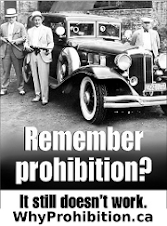Judge Jim Gray writes in a blog post Treating pot like alcohol:
"For example, in Holland, where anyone 16 or older can use marijuana and hashish, the minister of health reported that his country has only half the marijuana usage per capita than we do here — both for adults and for teenagers." "Then he went on to explain why, when he said that “We have succeeded in making pot boring.”
Also interesting to note, the Netherlands are closing prisons due to lack of criminals.
In 2001, Portugal decriminalized all drugs and the results are in. Excerpts from The Economist article Portugal's drug policy Treating, not punishing reports:
"The evidence from Portugal since 2001 is that decriminalisation of drug use and possession has benefits and no harmful side-effects."
“none of the nightmare scenarios” initially painted, “from rampant increases in drug usage among the young to the transformation of Lisbon into a haven for ‘drug tourists’, has occurred.”
"the incidence of other drug-related problems, including sexually transmitted diseases and deaths from drug overdoses, has “decreased dramatically”.
"...offenders in Portugal are sent to specialist “dissuasion commissions” run by the government, rather than into the judicial system. “In Portugal,” he says, “the health aspect [of the government’s response to drugs] has gone mainstream.”
"The aim of the dissuasion commissions, which are made up of panels of two or three psychiatrists, social workers and legal advisers, is to encourage addicts to undergo treatment and to stop recreational users falling into addiction. They have the power to impose community work and even fines, but punishment is not their main aim. The police turn some 7,500 people a year over to the commissions. But nobody carrying anything considered to be less than a ten-day personal supply of drugs can be arrested, sentenced to jail or given a criminal record."
"Officials believe that, by lifting fears of prosecution, the policy has encouraged addicts to seek treatment. This bears out their view that criminal sanctions are not the best answer. “Before decriminalisation, addicts were afraid to seek treatment because they feared they would be denounced to the police and arrested,” says Manuel Cardoso, deputy director of the Institute for Drugs and Drug Addiction, Portugal’s main drugs-prevention and drugs-policy agency. “Now they know they will be treated as patients with a problem and not stigmatised as criminals.”
"Portugal has one of Europe’s lowest lifetime usage rates for cannabis. And most notably, heroin and other drug abuse has decreased among vulnerable younger age-groups."Read the Cato Institute Report “Drug Decriminalisation in Portugal: Lessons for Creating Fair and Successful Drug Policies.” By Glenn Greenwald.
Since August of this year, in an attempt to lower drug use and prohibition related crime, Mexico (Mexico’s Drug Decriminalization Law Effective Today) and Argentina (Argentina Decriminalizes Personal Drug Consumption) are also giving decriminalization a go. According to some reports, Brazil and Ecuador are considering similar steps.
The Netherlands and Portugal have been approaching drug policy realistically and with compassion .... Canada should indeed take a closer look at what is working for them, instead of following down the same doomed path of the U.S.
"Either we're the most evil people on earth, or we're doing something wrong."
We incarcerate 756 inmates per 100,000 residents, nearly five times the world average. At this point, approximately one in every 31 adults in the United States is in prison, jail, or on supervised release. Local, state, and federal spending on corrections now amounts to about $70 billion per year and has increased 40 percent over the past 20 years."
~Senator Jim Webb
Canada meanwhile, ignores such important experience and is trying to fall deeper into the Drug War Abyss.















No comments:
Post a Comment
High! Thanks for taking the time to leave a Comment. :)